#英語
Text

〈視野広がる〉
友人夫婦がお家に遊びに来てくれました
幼稚園お迎え迄の短時間ですが
外国の方と英語で少しお話し出来たので
子育ての価値観や世界観が広がりました
英語で話せる機会を沢山作っていこうと思いました。
#絵日記#illustration#art#イラスト#絵#子育て#線画#line drawing#日記#picture diary#絵と子育て#トーク#英語#コミュニケーション#世界観#価値観#広がる
22 notes
·
View notes
Text

You must study English hard.
(君は懸命に英語を学ばなければならない。)
少しずつ。コツコツと。
色んな事をこれから学んでいきます。
宜しくお願い致します。
英文は自分に向けた言葉です。
9 notes
·
View notes
Text


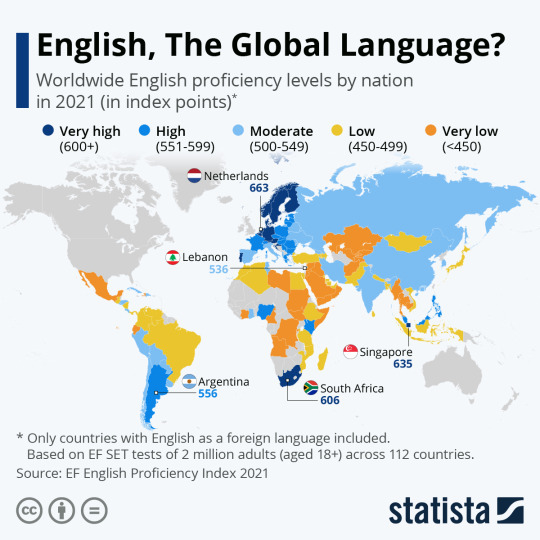
Parte 2:Razones por las que a los japoneses jamás se le va a dar bien el inglés: Sean bienvenidos, japonistasarqueológicos, a una nueva entrega, en esta ocasión hablamos del inglés en Japón, una vez dicho esto pónganse cómodos qué empezamos.
-
Por la que a los japoneses les cuesta el inglés más de una te sorprenderá, los japoneses para poder aprender inglés desde cero les lleva alrededor de 500 horas alcanzar el nivel principiante; sin embargo, se necesitan unas 250 horas para aprender coreano o indonesio al mismo nivel principiante. Una de las razones por las que los japoneses no son buenos en inglés es debido a la pronunciación, esto es un hecho.
-
La estructura gramatical del inglés es: SVO (sujeto-verbo-objeto) donde el verbo va primero, mientras que en japonés, SOV (Sujeto-Objeto-Verbo) donde el verbo va al final. Además, la estructura de las oraciones difiere entre el inglés y el japonés, el inglés es muy estricto en cuanto al orden de las palabras. En japonés utilizamos unas 120 palabras en un minuto de conversación normal. El inglés emplea aproximadamente 1,5 veces más palabras, razón por la cual los japoneses sienten que hablan inglés más rápido. Por ejemplo, la palabra japonesa “personalidad” tiene tres fonemas. Cuando se trata de inglés, necesitamos cinco fonemas: pa/so/na/li/ti, y para transmitir la misma información, necesitamos hablar más rápido. La razón por la que a los japoneses les resulta difícil escuchar y hablar inglés es probablemente porque se les exige que usen habilidades que normalmente no emplean.
パート2:日本人が決して英語が得意にならない理由:日本の考古学者たちよ、新しい回へようこそ!今回は日本の英語について話す。
-
なぜ日本人は英語が苦手なのか?日本人がゼロから英語を学んで初級レベルに達するには約500時間かかるが、韓国語やインドネシア語を学んで同じ初級レベルに達するには約250時間かかる。日本人が英語を苦手とする理由のひとつに発音があるが、これは事実である。
-
英語の文法構造はSVO(Subject-Verb-Object)で動詞が先に来るのに対し、日本語はSOV(Subject-Object-Verb)で動詞が最後に来る。また、文の構造も英語と日本語では異なり、英語は語順に非常に厳しい。日本語の場合、通常の会話で1分間に使う単語は約120語。英語はその約1.5倍の単語を使うので、日本人は英語を話すのが早いと感じるのです。例えば、日本語の「パーソナリティ」という単語には3つの音素がある���それが英語になると、パ/ソ/ナ/リ/ティの5つの音素が必要になり、同じ情報を伝えるためには、より速く話す必要がある。日本人が英語を聞くのも話すのも難しいと感じるのは、普段使わない能力を要求されるからだろう。
-
今後の記事でお会いできることを楽しみにしています。
Part 2: Reasons why the Japanese will never be good at English: Welcome, Japanese archaeologists, to a new instalment, this time we are talking about English in Japan, so make yourselves comfortable and let's get started.
-
Why the Japanese have a hard time with English more than one will surprise you, it takes the Japanese around 500 hours to learn English from scratch to reach beginner level; however, it takes around 250 hours to learn Korean or Indonesian to the same beginner level. One of the reasons why Japanese people are not good at English is because of pronunciation, this is a fact.
-
The grammatical structure of English is: SVO (Subject-Verb-Object) where the verb comes first, while in Japanese, SOV (Subject-Object-Verb) where the verb comes last. Also, sentence structure differs between English and Japanese, English is very strict about word order. In Japanese we use about 120 words in one minute of normal conversation. English uses about 1.5 times as many words, which is why Japanese people feel they speak English faster. For example, the Japanese word "personality" has three phonemes. When it comes to English, we need five phonemes: pa/so/na/li/ti, and to convey the same information, we need to speak faster. The reason why Japanese people find it difficult to listen to and speak English is probably because they are required to use skills they do not normally use.
-
I hope you like it and see you in future posts, have a good week.
14 notes
·
View notes
Text
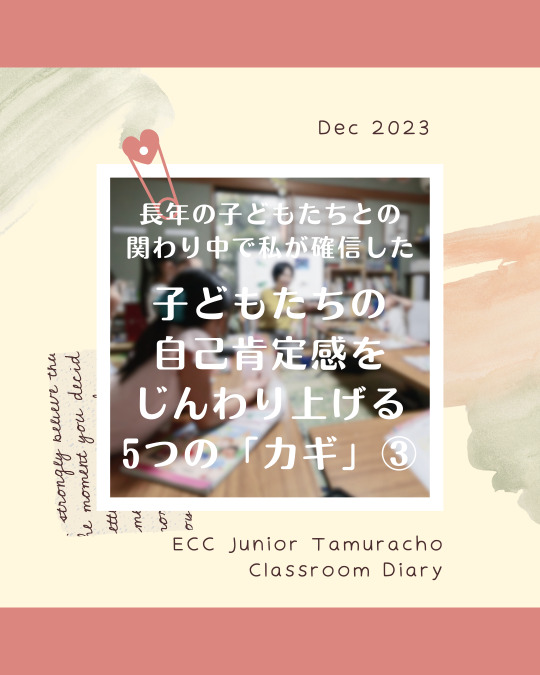
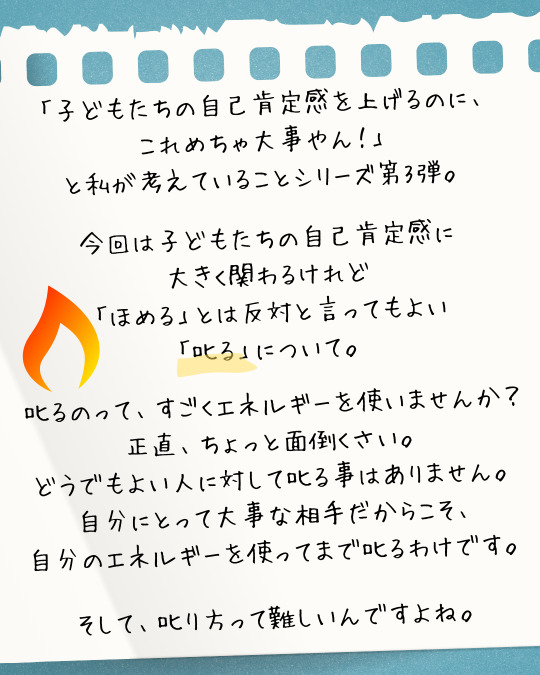


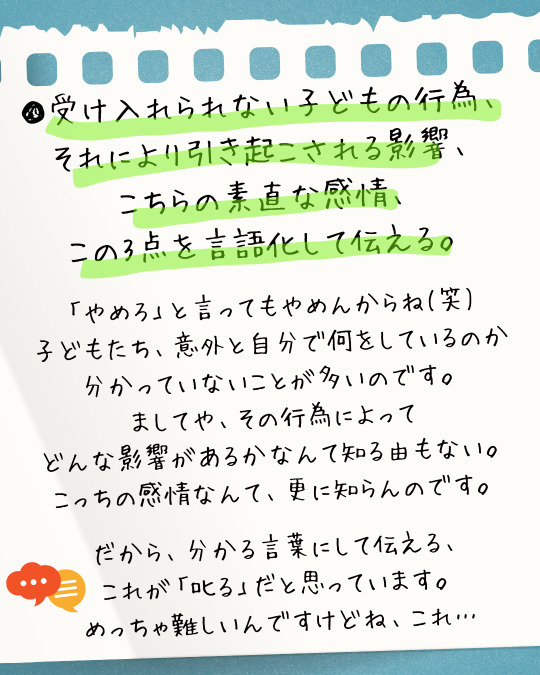
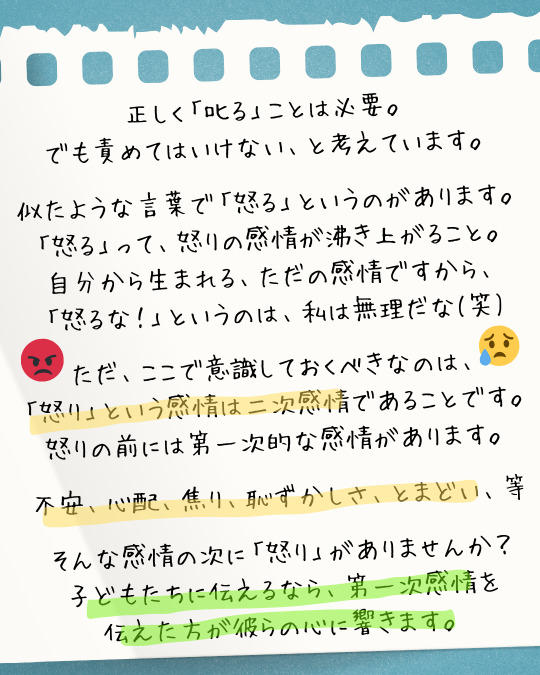
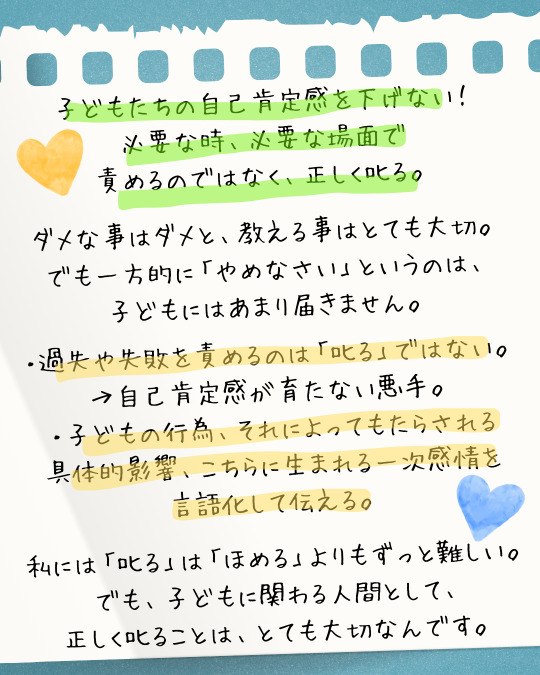
ECCジュニア田村町教室、そろそろ冬休み漫画解禁したい中村です。
12月、各種お仕事、色々と乗り越え、年内は残すところ、あと数件の体験レッスンのみ!
いや…横に目を向けるとレシートの山とか真っ白な年賀状とかあるけど、もう見ないっ(爆)
というわけで、暫く投稿できていませんでしたが久しぶりに自己肯定感シリーズ。
今回は「叱る」ことについて。
自己肯定感を上げる、というよりは、下げない叱り方、ということで、自分が意識している事���です。
叱り方に関しては、ずっと学んでいる親業の会話手法を踏襲しています。
サラッと叱り方を書きましたが、これ、マジで難しい。
人を叱るのに、自分の感情や思考を見つめなおして言語化するとかね、たーいへん。
行動や影響を伝えるのも、なかなかどうして簡単じゃないのです。
こればっかりは日々訓練だし、多分一生試行錯誤かもな。
あと怒りの感情も厄介ですな。
怒りが頂点までいくと、言語化とか無理です。
自分の第一次感情なんて、とてもじゃないけど気づけんわ。
だから私の場合は、頂点に行くよりもずっと前の段階から、いやもう普段から、子どもたちの前で感情を出し、言葉で伝えるように努力してます。
いい感情も悪い感情も。
言葉に出来るうちは、まだ自分が冷静だし、その言語化によって逆に感情がなだらかになる事も多いです。
非難ではなく、事実でもって叱ることは、子どもたちの自己肯定感を下げることなく、大事な事を伝える手段だなと思っています。
…何度も言いますが、簡単ではない。
日々子どもたちと対峙している親御さんたちなら、なおさら難しいと思う。
でも「叱る」という面倒くさいことができるのは、親御さんたちの子どもへの愛情があるからこそ。
その愛情が正しく子どもたちに届くに越したことはないわけです。
怒りに任せて責め立てるのではない、伝わる叱り方って、やはり大切なのだと思います。
7 notes
·
View notes
Text
First Post!
Hey guys, this is my first post on this account. To get started as a brand new blog, I'd like to talk about how I am currently learning the language.
Currently, I am using visual novels (VNs) to learn new things. The reason for this is the exposure to new grammar and vocabulary isn't brutal because there isn't much exposition to be had when you compare it to the likes of a short story or novel. You also get to understand the nuances of speech, as well as the pronunciation of words since VNs are typically voice-acted.
However, just reading the visual novel doesn't fill in all the gaps of knowledge you constantly encounter due to all the words and meanings you haven't learned yet. For this, I use a couple of tools that takes the text in the visual novel, and pastes it into a tab on my Google Chrome. This tool is called Textractor.
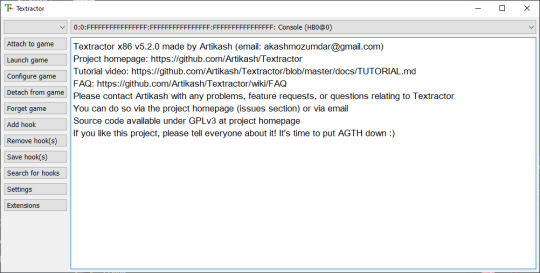
The above is the textractor app before I boot up the VN.
Below is the Chrome tab with the pasted text.

Why do I do this? Because it'd be insanely difficult to figure out how a word is read if I can't search it up due to it being locked behind a game. However, why google individual words up when you can use something as amazing as a Google Extension?
Yomi-chan is an add-on that can show you the meanings of words on your browser. It uses a variety of dictionaries to tell you the meanings of words, Kanji, phrases, and grammar! Below, is an image of me hovering over a word that maybe I'm not sure of.
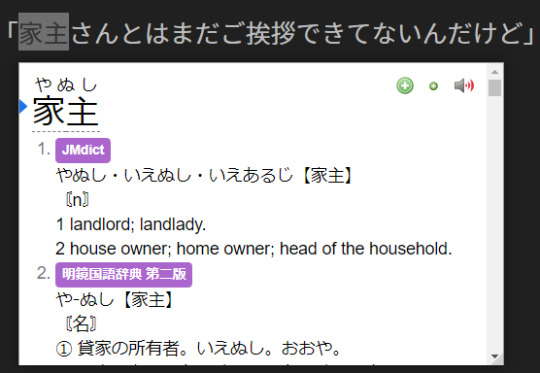
Now I know what a word means, and how to read it too. I can even listen to what it sounds like, as Japanese does have vocal intonations that you might need to be aware of for maximum fluency.
Okay, so we now know what that word says. What's the chance of me actually knowing what it means the next time the word comes up? Aside from it being a pretty easy word, let's say it was super difficult! I'd have a tough time constantly searching EVERY word over and over again to understand them. And this is where repetition is great (in a more fun and productive way).
Anki cards! Anki cards are essentially flashcards where you can store your newly found vocabulary for repetition learning later. Make your own Anki deck is likely excruciatingly time-consuming. Imagine for every word you don't know, you have to write the word in Kanji, the pronunciation, the meaning, etc...
The cool thing is, you can actually connect Yomi-chan to your Anki deck, making it easy to just hit a button to add not just that word and it's meaning, but also the sound files for pronunciation, the sentence it originated from for contextual help, and even images!
This way you can just click the button, and move on with reading. It takes literally 1 second.
I then study my Anki cards every morning (or at least I try to)!
I'd love to learn more about how other people learn, and I think my method works pretty well for me.
27 notes
·
View notes
Text
Family in Japanese
Family 家族 かぞく
Relatives 親戚 しんせき
I 私 わたし
Older Brother (お)兄さん (お)にい-さん/ちゃん*some people also say 兄貴 あにき(informal), 兄 あに(formal), にいに (baby word)
Younger Brother 弟 おとうと
Older Sister お姉さん (お)ねえ-さん, あね (formal), ねえね(baby word)
Younger Sister 妹 いもうと
Siblings - *if there is at least one male 兄弟 きようだい (literally means older/younger brother) , *if there are only girls 姉妹 しまい (same as 兄弟, it means older/younger sister)
*please note when someone asks you how many siblings you have, you must also count yourself for example - you have two older brothers and then there's you, in English you would say "I have two siblings." In Japanese the question is closer to " How many siblings are in your family?" So you count yourself and say "three siblings" (〜人兄弟/〜にんきょうだい)
Parent 親 おや
Both Parents 両親 りょうしん
Mother お母さん おかあさん / a lot of young people also say mama (it's not seen as childish in Japan) (informal), 母(親) はは(おや) (formal) , 母上 ははうえ (not really said that much anymore but you do sometimes hear it)
Father お父さん おとうさん/ along with mama, papa is used quite a lot and is also not seen as childish (informal), 父(親) ちち(おや) , 親父 おやじ (formal)
(random fact 'sugar daddy' in Japanese is called papa - katsu (パパ活)(活means activity)
*lots of couples with children will often call each other お母さん/お父さん instead of their actual names
Grandma おばあ-さん/ちゃん (informal), 祖母 そぼ (formal)
Grandpa おじい-さん/ちゃん (informal), 祖父そふ (formal)
*For great grandparents just add ひい for example ひいおばあさん
Uncle おじさん
Auntおばさん
Son 息子 むすこ
Daughter 娘 むすめ
Cousin いとこ
28 notes
·
View notes
Text



3 notes
·
View notes
Quote
藤原 明人
詳しい分野:英語(言語) 更新日時:10ヶ月
英語がある程度話せるようになって4~5年の頃には分からなかったけど、15~30年たった頃に分かったことを10個選んでみました。ずっとアメリカに住んでいるので、アメリカ限定です。
1 ヘンテコな、不自然な英文と普通の、自然な英文の区別がつくようになった。大量の英文が頭にトックされることで可能になった。
2 ハイレベルな、難易度の高い語彙や表現を使って話す・書くのではなく、分かりやすい語彙と表現で話し、書くこと方が大事。一時期、必要以上に難しい単語と表現で話したり書いたりしてた時期があったんですが、それで誰が得をするんでしょうね。やたら難しい英語で書く、話すのは意外と容易にできます。分かりやすい表現にうまく調節して話すのは結構難しいです。
3 丁寧な話し方とカジュアルな話し方の文体と口調の違い。使い分けられるようになった。
4 どういう感情がどういう口調で表現されるか。自然な口調で感情を込めて話せるようになった。
5 「英語力=英語ペラペラ」ではない。ペラペラに話すには自分の意見がちゃんとあること、スピーチスキル、コミュニケーションスキルが必要。テレビやメディアに出てくる英語ネイティブはみんなペラペラですが、現実では英語ネイティブでも結構たどたどしく話すことがある。
6 不自然な言い回しをしても、自然な口調で話せば相手には自然に聞こえる。不自然な言い回しを不自然な口調で話せば「不自然な英語」に聞こえる。不自然な言い回しを自然な口調で話せば「独特の表現スタイル」に聞こえる。
7 より正確に母音子音を発音することより、現地の英語のリズムとアクセント(口調)で話す方が聞きやすい英語になる。特にアメリカ英語では強調しない部分は母音が曖昧でもOK。あと、「あ・い・う・え・お」のように音と音をはっきりと途切って話さず、「あ~い~う~え~お~」のように繋げて話す方がより自然。
8 英語の自然さと上手さは、発音の良し悪しより、英語っぽい声で話してるかどうかで評価されがち。男の場合、リラックスして、声を響かせる感じ。それと、力むと「あ・い・う・え・お」と言うみたいに途切れた (choppy) 話し方になる。
9 英語の聴き取りにおいて、自分がかなりの部分を「言葉の推測と予測」、「英語のリズム」に頼って聴きとっていること。おかげで英語の歌もかなり聞き取れるようになった。
10 様々なアクセント(訛り)の違い。アメリカ国内では南部、黒人、ヒスパニック訛りとか、国外ではイギリス、インド、オーストラリアとか。あと、外国人訛りの多様性もとても面白いです。
※追加:これはあまりペラペラではなかった頃(英語が話せるようになって7年目ぐらい)に分かったことです。
1 英語の意味を日本語で覚える必要はない。アメリカ留学5年目ぐらいに、必要に迫られ、新しい単語をコンテクストとして記憶するようになりました。つまり「こんな状況のときに、誰々が、こんな理由・気持ちで、こんな風に、○○という言葉を言って、自分はこう思った」のように英単語・フレーズが使われた状況を視覚・感覚を交えた実体験として記憶していました。いちいち辞書で調べている時間が無かったので「体験⇔英語」で単語の意味と用法を記憶してました。そうやって覚えた単語は、再び聞いたときには体験・経験的に意味が理解できました。話す・書く場合には、どの状況でどの単語を使ったらいいかが経験上分かりました。日本語や英英辞書で意味を覚えていた時にはできないことでした。結果、1日に5~30個のペースで新しい単語やフレーズを覚えはじめ、爆発的に英語の語彙力が伸びました。しかもそうやって覚えた言葉は最低5~6日忘れませんでした。
英語がペラペラになって分かったことはありますか? --- Quora
25 notes
·
View notes
Text
you know those shorter lightsabers which are called Shoto Lightsabers?


shoto is literally the word Short in Japanese accent (ショート), it's how Japanese people say "short"


#star wars#lightsaber#ahsoka tano#yoda#master yoda#japanese#日本の#英語#日本語#japanglish#shoto lightsaber#global strike#star wars prequels
3 notes
·
View notes
Text
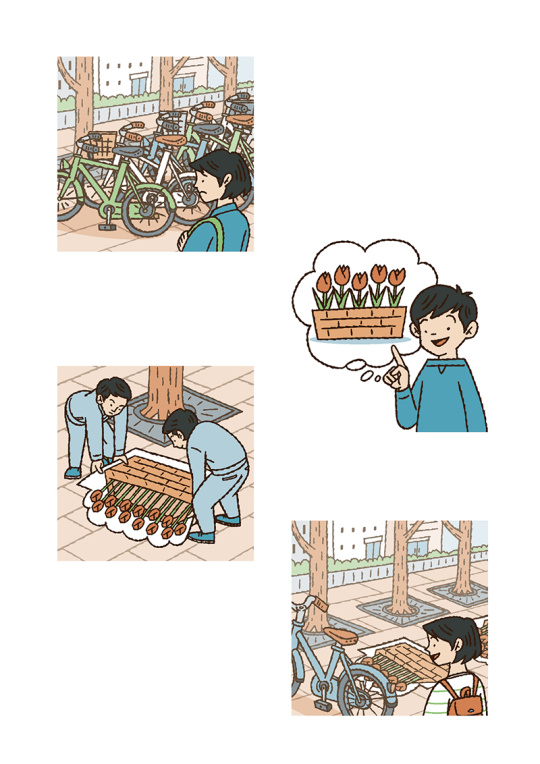
数研出版『BIG DIPPER English CommunicationⅡ』
3 notes
·
View notes
Photo

電源コード (pronnounced: dengen kōdo - でんげん こうど)
Which means: power cord.
La palabra de hoy:
電源コード (se pronuncia: dengen kōdo - でんげん こうど)
Significa: contacto eléctrico.
26 notes
·
View notes
Text

〈Customer service〉
昨日はお仕事で接客。9割が外国の方
日本語とgestureとFeelingで対応
もっと英語で話せるようにする。
#絵日記#illustration#art#イラスト#絵#子育て#線画#line drawing#日記#picture diary#feeling#gesture#customer service#仕事#接客#英語#英会話#育児#育児イラスト#子育てと仕事#子育てイラスト#study
34 notes
·
View notes
Photo



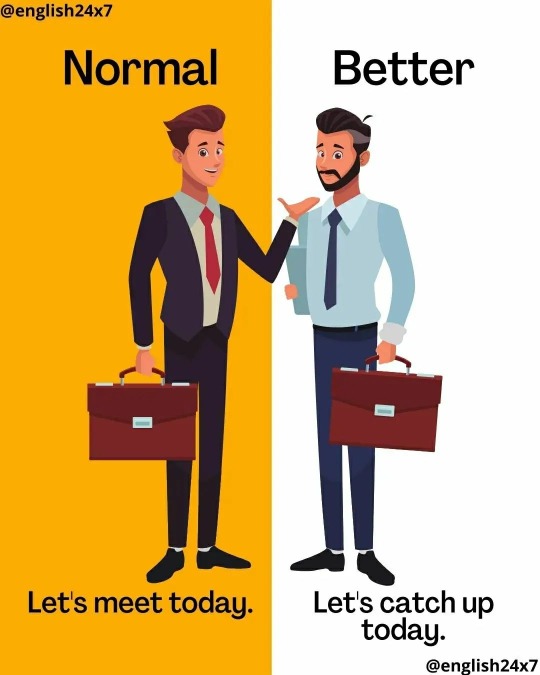
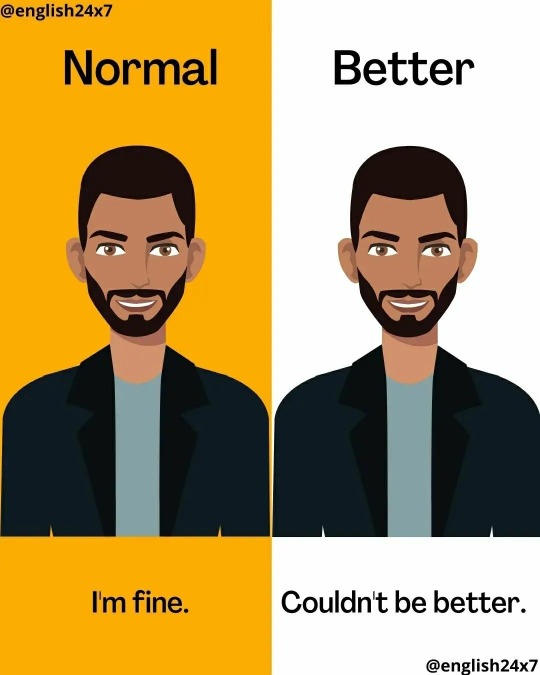
#english#englishspeaking#englishlearning#englishteacher#englishvocabulary#englishwords#englishtips#englishgrammar#esl#英語#ingles#ingilizce#английский#inglés#inglese#angielski#ingilizceöğreniyorum#ingilizceogren#americanenglish#britishenglish#learnenglish#ieltspreparation#vocabulary#englishlesson#aprenderingles#studyenglish#speakenglish#acronym#abbreviation#LanguageLearning
4 notes
·
View notes
Text
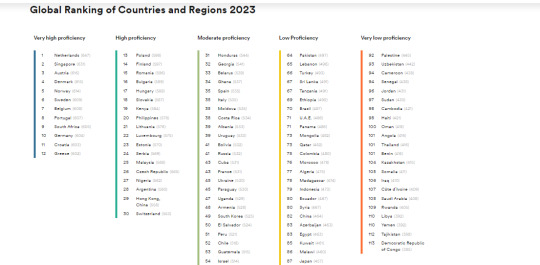
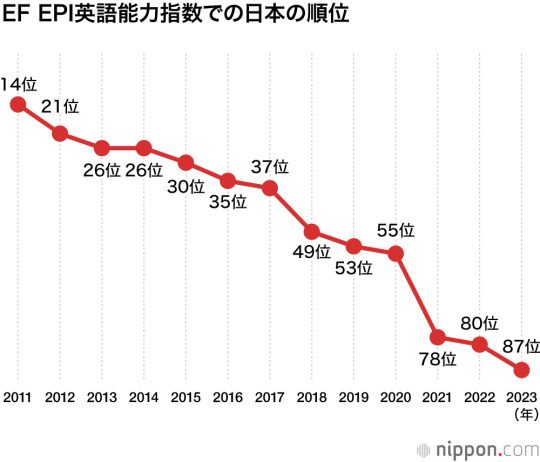

Parte 1:
Sean bienvenidos, japonistasarqueológicos, a una nueva entrega, en esta ocasión hablamos del inglés en Japón, una vez dicho esto pónganse cómodos qué empezamos.
-
¿Por qué en Japón el inglés es un idioma, no es muy hablado por los japoneses?
En Japón el 2% de los Japoneses hablan japonés de 125.507.000 personas, lo cual toparse con japoneses que hablen inglés es una tarea difícil, el Español, es un idioma más popular en Japón, además a los japoneses les encanta la cultura Española.
-
A pesar de que hablar con japonés en inglés es difícil principalmente porque les cuesta entender la pronunciación, por esa razón el katakana haya palabras en inglés pronunciadas malamente.
-
Espero que os guste y nos vemos en próximas publicaciones, que pasen una buena semana.
第1回
日本の考古学者の皆さん、新しい回へようこそ。今回は日本における英語についてです。
-
なぜ日本では、英語は日本人にあまり話されていない言語なのでしょうか?
日本では、1億2,550万7,000人の人口のうち、日本語を話す日本人は2%で、英語を話す日本人に会うのは難しい。
-
日本人と英語で話すのは難しいが、それは日本人が発音を理解するのが難しいからである。
-
今後の記事でお会いできることを楽しみにしています。
Welcome, Japanesearchaeologicalists, to a new installment, this time we are talking about English in Japan, having said that, get comfortable and let's start.
-
Why is English a language in Japan, not widely spoken by the Japanese? In Japan, 2% of the Japanese speak Japanese out of 125,507,000 people, which means that finding Japanese people who speak English is a difficult task. Spanish is a more popular language in Japan, and Japanese people love Spanish culture.
-
Although speaking with Japanese in English is difficult mainly because it is difficult for them to understand the pronunciation, for that reason the katakana there are English words pronounced poorly. -
I hope you like it and see you in future posts, have a good week.
7 notes
·
View notes
Text
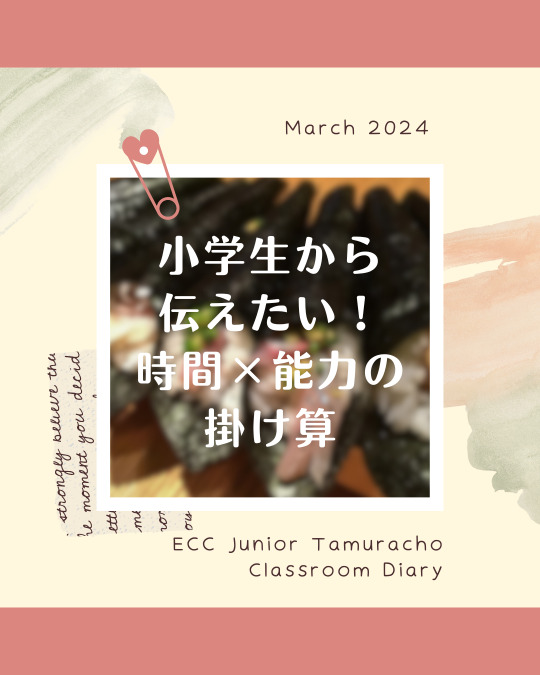

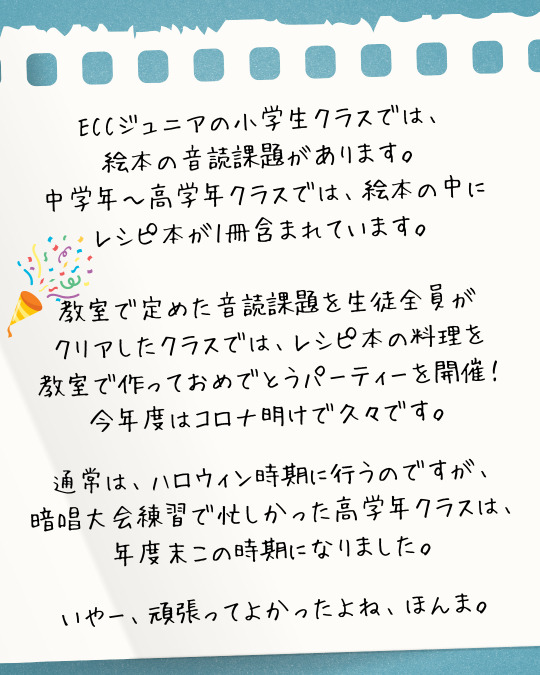
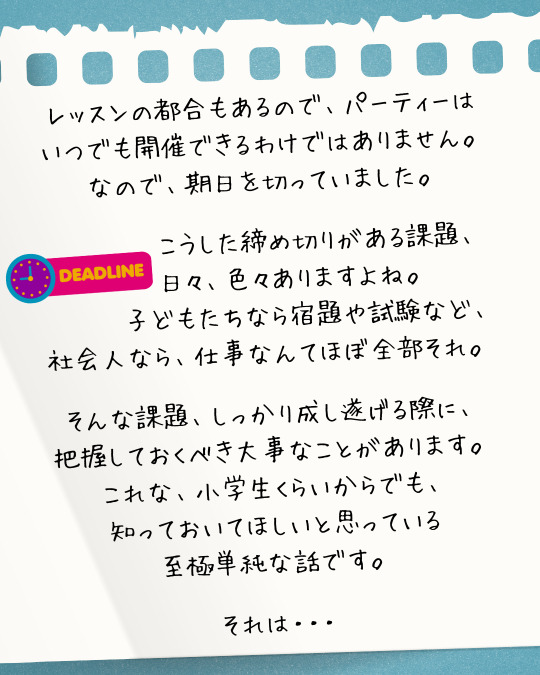



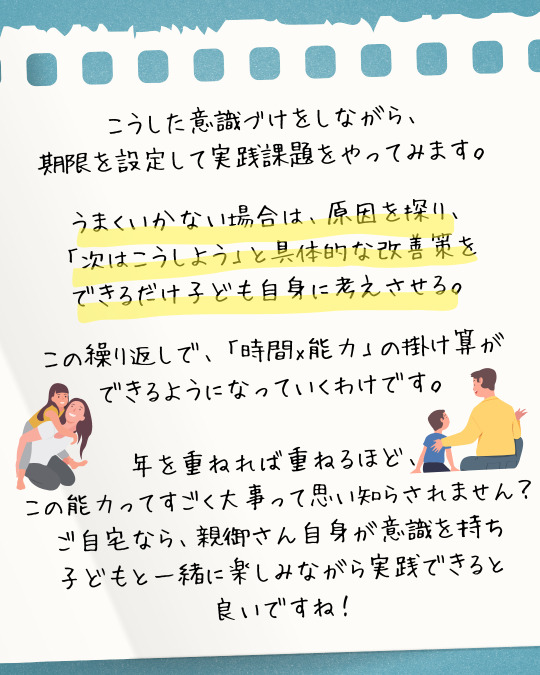
ECCジュニア田村町教室、ちょっと前に買ったMAKITAのハンディクリーナーが、かなりお気に入りの中村です。
デザイン的にはちょっと無骨。
でも機能的なこと、この上ない。
いやー、無骨さも機能性も、ほんま、好き。
さて、今年度の3月、何やらてんぱっています。
なんだか、もろもろ、やらねばならない事に+αでちょこちょこ対応せねばならない事が発生。
そんな時こそ、ほんと、自分の能力を把握しておくことが大切なんだよなー、という話。
そして能力はいろいろな状況で変動があることも考慮にいれておく必要があります。
ほら、年齢と共に確実に進行している老眼は、能力値を下げるわけですよ。。。
体調管理だって大事。
能力値の高さを維持するために、気持ちを穏やかに保ったり、BGMで気分を盛り上げるのっも大事。
自分のことを分かっていると、色々とできることの幅が広がるし、時間を効率的に使えるようになるよね。
・・・って分かってるのに、なんで私はこんなに今てんぱっているのか。
そう、色々把握した上で、時間面ではちょこっと余裕を持たせておかなければならないんですな。
ほら、予定外のことが起こった時に、その対応も必要だから。
いやまじ、分かってるならなんとかしろよ自分!という大ブーメランでセルフメンタル潰し中。
ま、でも、間に合わせます、全部!!
生徒のみんなは年度最後のお楽しみ週に突入しています。
その話は、また落ち着いたころに。
ECCジュニア田村町教室、2024年度4月生募集中!
➡️無料体験レッスンのご予約は、DMやプロフィールにあるウェブサイト内お問い合わせフォームからお気軽に!
3 notes
·
View notes
Text
そもそも「リテラシー」とはどういう意味?英語で「literacy」と記述するとの事。
ラジオを聞いているとまたひとつ、ちょっと気になるカタカナ英語を耳にしました。
「情報リテラシーとは…」
りてらしー。。??
なんとなく耳にしたことのあるこの「リテラシー」ですが、そもそもどういう意味になるのでしょうか?
ちょっと気になったので、早速調べてみました。
そもそも「リテラシー」とは英語で「literacy」と記述して、読み書きの能力、特定分野の知識、能力、などとの意味になるとの事。
今回の場合のようにカタカナ英語で使われる場合は、その分野の知識、といった意味で使われる模様でした。
なるほど。今回の場合は情報リテラシー、との事で、求めている情報を収集して正しく利用する能力、といった意味で使われいたのかと理解しました。
まだまだ理解の足りない語句がたくさんあります。またひとつ勉強になりました。

View On WordPress
9 notes
·
View notes